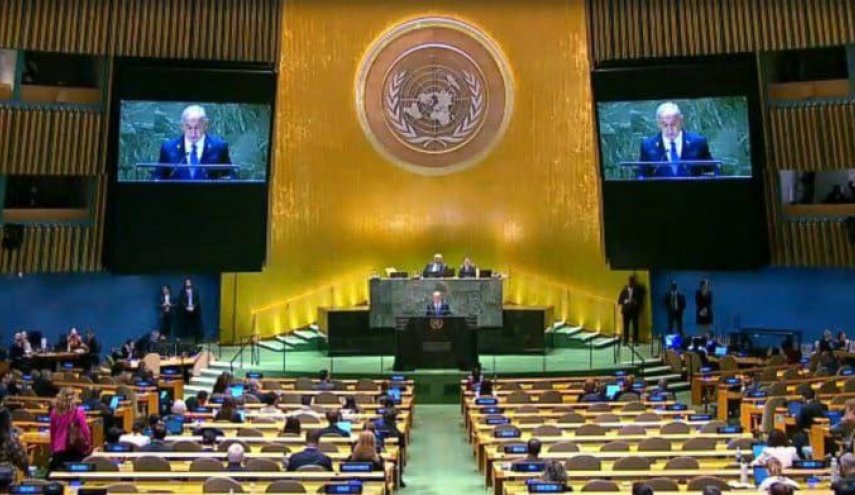Netanyahu's Speech at the United Nations: Propaganda Performance or Diplomatic Failure?
September 27, 20252268 ViewsRead Time: 2 minutes

Font Size:
16
In a scene reflecting Israel's increasing isolation on the international stage, Prime Minister Benjamin Netanyahu stood before a nearly empty hall at the United Nations General Assembly, in a speech that Israeli media described as "repetitive and devoid of any new visions".
The Israeli correspondent Lisa Rozovsky from Haaretz, who covered the event from New York, noted that the speech relied on various "propaganda tricks", starting with raising a map showing Israel surrounded by what he described as "defeated enemies", to broadcasting the speech in Gaza through loudspeakers and sending messages in Hebrew to Palestinian phones. But the most controversial was the "barcode" attached to the collar of his suit, which leads to images of Israelis killed in the October 7 attacks.
The biggest absence in the speech was any new political vision. Instead of presenting peace initiatives, Netanyahu reiterated his firm rejection of the establishment of a Palestinian state, ignoring the recent international changes that saw dozens of countries recognize the State of Palestine. He also launched an attack on European leaders who recognized this state.
Notably, Netanyahu sent a clear message to U.S. President Donald Trump, frequently citing American generals and mentioning the intelligence gains for Washington from cooperation with Israel. He even went so far as to accuse Iran of two assassination attempts on Trump.
Analysts believe that the speech targeted two main audiences: the right-wing base in Israel that will turn these scenes into propaganda material, and the American public that Netanyahu is trying to win over by promoting the image of Israel as a strategic ally of Washington.
It seems that the speech revealed Netanyahu's clear strategy: focusing on the security and media dimension, while abandoning any serious attempt to convince the international community of the validity of his political approach. This reflects a shift in Israeli policy towards a near-total reliance on American support, at a time when Israel's diplomatic isolation on the international stage is strengthening.
This scene raises questions about the future of Israeli politics in light of the absence of a political vision capable of dealing with regional and international changes, and the continued reliance on the American alliance as the only option in the face of increasing international pressures.
The Israeli correspondent Lisa Rozovsky from Haaretz, who covered the event from New York, noted that the speech relied on various "propaganda tricks", starting with raising a map showing Israel surrounded by what he described as "defeated enemies", to broadcasting the speech in Gaza through loudspeakers and sending messages in Hebrew to Palestinian phones. But the most controversial was the "barcode" attached to the collar of his suit, which leads to images of Israelis killed in the October 7 attacks.
The biggest absence in the speech was any new political vision. Instead of presenting peace initiatives, Netanyahu reiterated his firm rejection of the establishment of a Palestinian state, ignoring the recent international changes that saw dozens of countries recognize the State of Palestine. He also launched an attack on European leaders who recognized this state.
Notably, Netanyahu sent a clear message to U.S. President Donald Trump, frequently citing American generals and mentioning the intelligence gains for Washington from cooperation with Israel. He even went so far as to accuse Iran of two assassination attempts on Trump.
Analysts believe that the speech targeted two main audiences: the right-wing base in Israel that will turn these scenes into propaganda material, and the American public that Netanyahu is trying to win over by promoting the image of Israel as a strategic ally of Washington.
It seems that the speech revealed Netanyahu's clear strategy: focusing on the security and media dimension, while abandoning any serious attempt to convince the international community of the validity of his political approach. This reflects a shift in Israeli policy towards a near-total reliance on American support, at a time when Israel's diplomatic isolation on the international stage is strengthening.
This scene raises questions about the future of Israeli politics in light of the absence of a political vision capable of dealing with regional and international changes, and the continued reliance on the American alliance as the only option in the face of increasing international pressures.